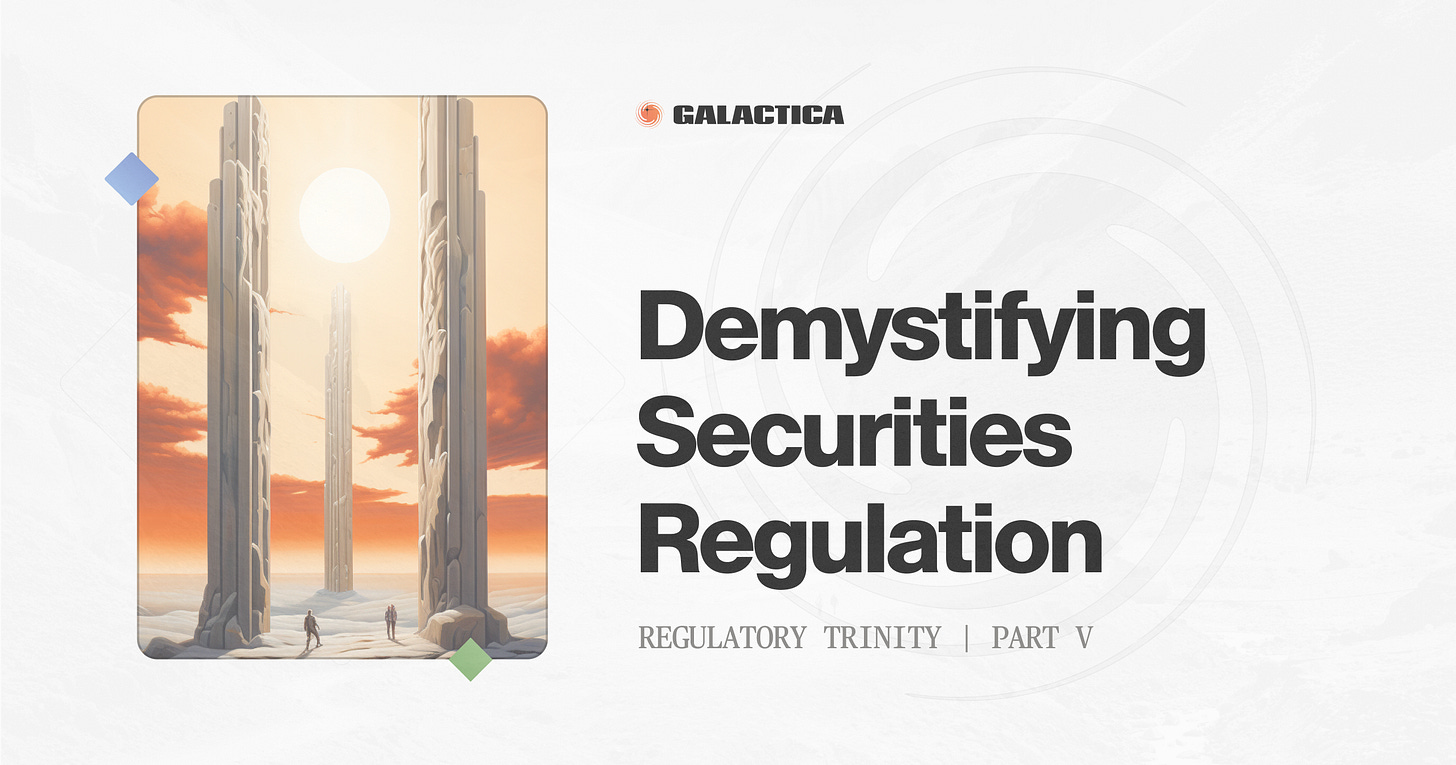Demystifying Securities Regulations in the Web3 Era
Securities regulations have a rich history of safeguarding investors within traditional financial markets, and as the web3 landscape rapidly expands, understanding how these regulations translate to the realm of digital assets becomes paramount.
Building on our previous exploration of DeFi app compliance, this article delves into the intricacies of securities regulations within the web3 era - we'll examine key legislation, case studies, and the ongoing debate on how to strike a balance between regulation and innovation within the world of digital assets.
Demystifying Securities Regulations in the Web3 Era
Securities regulations have a long and complex history, often shaped in response to crises triggered by episodes of extreme greed and unscrupulous behavior. The main goal of these regulations is to safeguard investors from bad actors and provide them with adequate information to make informed investment decisions.
The Securities Act of 1933, a cornerstone of securities regulation, broadly defines "security" to cover investment contracts or instruments. In the context of digital assets, the Act has been applied to Initial Coin Offerings (ICOs) and cryptocurrencies. To offer or sell digital assets deemed securities to the public, issuers must either register with the Securities and Exchange Commission (SEC) or seek exemptions from registration. Compliance with registration and disclosure requirements is mandatory for ICOs and token sales considered securities under the Act.
To determine if a digital asset qualifies as a security, the SEC applies the Howey Test. According to this test, an investment is considered a security if it involves an investment of money, in a common enterprise, with an expectation of profits derived from the efforts of others. This test has been crucial in clarifying the regulatory status of various digital assets.
Issuers of digital assets considered securities must provide comprehensive information about their business, the digital asset, and the associated risks to potential investors. Moreover, the Act contains anti-fraud provisions, ensuring that issuers, brokers, and dealers do not engage in fraudulent or manipulative practices.
Certain exemptions exist under the Act, such as Regulation D for private placements and Regulation A for smaller public offerings, allowing some digital assets to be exempt from registration requirements.
The Securities Exchange Act of 1934 grants the SEC the authority to regulate securities, securities markets, and market participants, including digital assets deemed securities and the platforms where they are traded. Platforms trading such digital asset securities may need to register as national securities exchanges, alternative trading systems (ATS), or broker-dealers, and intermediaries facilitating transactions must register with the SEC as broker-dealers.
The Act also includes provisions that prohibit fraud and manipulation in the trading of securities, which extend to digital assets that are considered securities. Public companies with digital asset holdings or operations must comply with financial reporting requirements and adhere to proxy rules for shareholder voting.
The Investment Advisers Act of 1940 requires registration of investment advisers providing advice on investing in digital assets deemed securities. Registered advisers must adhere to fiduciary duty, act in the best interests of their clients, and disclose information about their business practices and fees.
The Investment Company Act of 1940 applies to investment companies managing portfolios consisting of digital assets deemed securities, necessitating registration with the SEC, unless exemptions apply. The Act imposes requirements related to management, governance, diversification, risk management, disclosure, and asset valuation.
The Commodity Exchange Act of 1936 (CEA) falls under the purview of the Commodity Futures Trading Commission (CFTC) and asserts jurisdiction over certain digital assets, particularly cryptocurrencies, considering them as commodities. The Act regulates the trading of futures, options, and swaps on commodities, including digital assets. Market participants trading digital asset derivatives must register with the CFTC and comply with relevant regulations.
The Securities Investor Protection Act of 1970 (SIPA) provides limited protection to customers of failed broker-dealers, including those holding digital assets deemed securities. However, it's essential to note that SIPA coverage for digital assets is limited, and cryptocurrencies like Bitcoin or Ethereum are generally not covered.
Over the years, several entities and individuals have faced enforcement actions for violating securities laws related to digital assets. For instance, in 2019, the SEC halted an alleged unregistered digital token offering by Telegram Group Inc., while Bitqyck Inc. and its founders were charged with violating securities laws for unregistered offerings and misrepresenting their business capabilities.
More recently, Ripple Labs Inc. and its executives faced SEC charges for conducting an unregistered digital asset securities offering, and crypto entrepreneur Justin Sun was charged with multiple securities law violations.
These examples illustrate the importance of adhering to securities regulations and the potential consequences of non-compliance. As the web3 space continues to evolve, it is crucial for market participants to stay informed about the regulatory landscape and ensure compliance to foster a secure and transparent environment for investors and innovators alike.
The Trinity Continues..
The evolving nature of digital assets calls for a nuanced approach to regulation, and with concepts like Disclosure NFTs emerging, exploring innovative ways to uphold investor protection is key.
In the next installment of this series, we'll dive deeper into how Disclosure NFTs can enhance accountability and transparency within web3 platforms, examine the practical implications of this, and discuss how Galactica Network's RegTech stack can further support the automation of this regulatory approach.
Join the DevNet V2.0 TodayWebsite | Twitter | Telegram | Discord | News | Reddit | YouTube | Zealy| Notion | CypherState | Telegram Community




